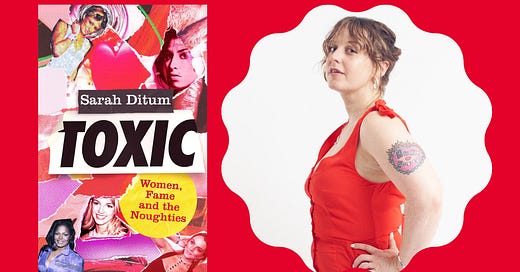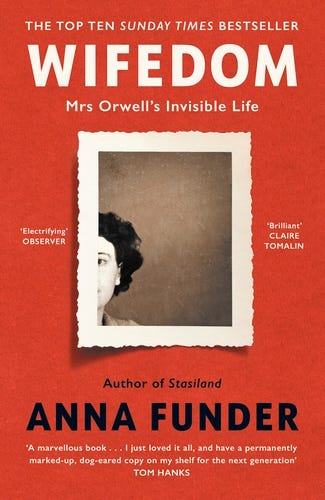Did I mention that ☠TOXIC: WOMEN, FAME AND THE NOUGHTIES☠ is now available to buy and you should absolutely do so? My favourite review is the one in the New Statesman by Ann Manov, who called it “illuminating” and “thrilling” (THANK YOU ANN). It’s a strange thing to live with a book for as long as it takes to write — in this case, either two years or 24, depending on whether you count from when I wrote the proposal or when my Britney obsession began — and then just let it loose into the world for other people to have opinions on. But, cliche as it is, there’s also nothing better than when someone else gets it. I hope you’ll get it too.
I’m not doing many events before Christmas, but there is one this Wednesday: an in-conversation with Mother+ in London, which I think is going to be huge fun. There are still tickets, so snap to it if you fancy coming along, and I’ll see you tomorrow!
Here are some other things that I’ve been doing…
Listened
“Borrowed” by LeAnn Rimes
I interviewed LeAnn Rimes last week, a person I have not thought about for quite a few years. In the UK, her big hits (“How Do I Live”, “Can’t Fight the Moonlight”) happened in the nineties when she was still a teenager. But in the US, country is its own whole big deal rather than an occasional visitor to the charts, and she thoroughly outgrew her child stardom.
She also ended up the wrong side of a lot of gossip. That happened first via court cases against her father/manager and her label in the early noughties challenging what she saw as unfair contracts (press at the time led with the angle that Rimes was a “brat”; now I think she’d be seen as rightly standing up for her own artistic freedom). Then her affair with actor Eddie Cibrian (that’s Cole from Sunset Beach, for any fellow late nineties Channel 5 daytime watchers) was made public in 2009 and became a tabloid firestorm, with LeAnn cast as the hateful homewrecker.
The couple married in 2011 and are still together. More importantly (for me), the relationship laid the foundation for much of Rimes’ 2013 album Spitfire — including this lovely ballad from the other woman’s POV (the version above is a rerecording she did with Stevie Nicks). It’s just a great piece of the morally complex melancholy that country does best, and it’s sent me back to Lyle Lovett and Mary Chapin Carpenter too.
Watched
Robbie Williams (Netflix)
First thought on watching this four-parter: wow, Robbie Williams is really at ease with his body. I’m not sure if he wears trousers for more than a quarter of the run time. It’s been slated by some reviewers (Camilla Long in the Sunday Times, Rachel Aroesti in the Guardian) for being “grim navel gazing”, but I found it riveting. The format is ingenious: we watch Robbie watching himself, as he revisits archive behind-the-scenes footage going back to his Take That days. (God he was pretty.)
Director Joe Pearlman is a veteran of documenting the fame-scarred — he did the Bros documentary, and the Lewis Capaldi one. As has been widely noted, we are back in the era of access journalism when it comes to celebrities. They don’t need the media to reach the public (they have Instagram), so when they’re profiled, it’s going to happen on their terms. Docs like Pearlman’s aren’t necessarily puff jobs (Pearlman says he doesn’t give final cut approval), but they are more likely to present the celebrity’s preferred version of themselves.
That doesn’t mean what you see is inevitably flattering or unrevealing (though it can certainly be fudged — note some of the criticisms of the Beckham documentary). Robbie wants to be seen as having been in pain, and not every viewer is going to respond sympathetically to that, as the reviews evidence. I felt compassionate towards him without feeling exactly warm: fame clearly did a number on him, but he treated a lot of people around him horribly and he’s surely on the money when he calls himself a “want monster”.
What a great phrase that is, though, and indicative of his talents as a lyricist. The strange thing is that, even while his fame was ripping him to bits, he made it his muse: “Radio”, “Rock DJ”, “Feel”, “No Regrets” — so many songs that are about the vacuity and poison of being a public figure. Robbie was celebrity turned self-aware. In Nabokov’s definition of solipsism, he was the ape painting the bars of its own cage.
So what did he do when fame faltered? Went back for seconds, and thirds. There’s an unsettling bit of the documentary when the archive footage shows Robbie just on the cusp of solo megastardom. “My last memory of being really, really famous,” he says, “was being really, really sad with it.” Older Robbie watches younger Robbie with what looks like an expression of incredulity at the youthful naivety; but then here he is again, inviting us to watch.
Read
Anna Funder, Wifedom: Mrs Orwell’s Invisible Life (Viking)
If an actually helpful version of Clippy existed, I like to imagine it would have popped up at the start of Funder working on this manuscript to say something like: “It looks like you’re writing a polemic about the exploitation of wifework under patriarchy. Are you sure you want to do that in the form of a biography of Eileen O’Shaughnessy?” The most obvious issue here is that O’Shaughnessy (“Mrs Orwell”) can’t really be said to have an “invisible life”, since she was the subject of a biography by Sylvia Topp two years ago.
But I haven’t read the Topp, and maybe that’s because Funder’s premise is more jagged and grabbier. She’s not just telling a life, she’s redressing an injustice — as she sees it, Orwell’s mistreatment of O’Shaughnessy and expropriation of her labour. On the one hand: Orwell does sound like a bloody nightmare of a husband, though perhaps his cheating and household shirking were not especially egregious for his time. On the other: to make her case, Funder resorts to passages of fiction, in which she conjures the most anti-Orwell/pro-O’Shaughnessy version of every incident.
I felt squeamish about the mixing of fiction with biography — perhaps I’m a priss, but when your imagined supplements exceed the documentary evidence, I think you ought to throw in the towel and just write a novel. There are also a couple of errors that Funder will correct in the reprint, which are maybe less significant in themselves than for the fact that they all fall in the direction of traducing Orwell.
And yet I’m also aggravated by the impulse I see from some people to defend Orwell as an avatar of decency, when he really was a piece of work in many regards (though not necessarily an exceptional piece of work). In other words: this is toxoplasma of rage-bait, and I suspect that it’s precisely because of Wifedom’s demerits as a biography that it’s going to end up being argued about and read for a very long time.
Gimme, gimme more…
I’ve been fascinated the anthropologist Sarah Blaffer Hrdy’s work since I read her book Mother Nature, in I think 2004. One way to describe her influence is to say she put female agency into the story of evolution. Another way is to say she treats human violence as an adaptation, not an aberration. This edition of The Life Scientific with her was great, not least because she’s completely without coyness about the fact that she built her career on a heap of family money.
Did you know octopuses just kind of give up and die once they’ve mated? Probably yes, if you watched My Octopus Teacher on Netflix, but I did not because I read this piece by Sophie Lewis which is allegedly about the film but is actually about Lewis having sex (???) with a lake (????), and it put me right off. Anyway, this week I found out about octopus senescence. Upsetting!
Ugh the SYNERGY of Taylor Swift and Travis Kelce! The combined reach of Miss Americana and the Kansas Chiefs tight end! Love, but make it great for the brand ❤






God I cannot STAND writers who stick fiction into (the stupidly named) non-fiction. I was reading Tony Parker's Lighthouse, supposedly an oral history, and I was sitting on the forecastle of a container ship (cos it's me, obvs) and once I'd finished it, I read the acknowledgments and it said "some characters are composites." No no NO that means "some characters are made-up." I absolutely and totally agree with you that she should have either ditched the fiction or written fiction. I threw Lighthouse across the fo'csle, I was so angry.
I devoured Toxic with a mixture of outrage and shame. I remember being silly enough to hate Paris Hilton without really knowing or understanding what she was doing. But I too miss the piss-taking nature of a lot of British media, whilst acknowledging that a lot of it missed what we’d now see as trauma-related behaviour. Thank you for writing it.